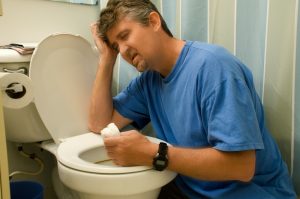 Traveler’s diarrhea is a common disorder experienced by people on vacation. Characterized by loose stool and abdominal cramps, it can be developed from consuming contaminated food or beverages. Generally, traveler’s diarrhea isn’t a serious problem and will resolve on its own, but unfortunately, it can put a serious damper on your vacation.
Traveler’s diarrhea is a common disorder experienced by people on vacation. Characterized by loose stool and abdominal cramps, it can be developed from consuming contaminated food or beverages. Generally, traveler’s diarrhea isn’t a serious problem and will resolve on its own, but unfortunately, it can put a serious damper on your vacation.
Traveler’s diarrhea commonly occurs when you are in a setting where sanitation practices are different than in your home country. You are not immune to the germs and bacteria that may be present, so your risk of experiencing a gastrointestinal problem increases.
Advertisement
There are ways you can lower your odds of getting traveler’s diarrhea, although it is hard to eliminate the risk completely as you never know where bacteria could be lurking.
Traveler’s diarrhea causes and risk factors
Traveler’s diarrhea can be caused by the stress of travelling or a change in diet. Most cases involve an infecting agent. Traveler’s diarrhea typically occurs after consuming contaminated food or beverages, so the infecting agent takes over your digestive tract, causing symptoms.
Our bodies are accustomed to the bacteria in our own countries, but when we enter a new environment we are not immune to new bacteria. Locals will not get sick, even if they have the same meal as you, because their bodies are accustomed to their local bacteria.
Millions of people are affected by traveler’s diarrhea each year, but you don’t have to be one of them. Risk factors for traveler’s diarrhea include being a young adult (which means lack of immunity compared to an older adult), having a weakened immune system, having diabetes or inflammatory bowel disease, taking acid blockers or antacids, and traveling during certain seasons such as heading to Asia during the hot season.
Symptoms of traveler’s diarrhea
Symptoms of traveler’s diarrhea include:
- Abrupt diarrhea
- Nausea and vomiting
- Bloating
- Urgent need to pass a bowel movement
- Weakness or discomfort
- Explosive or painful gas
- Cramps
- Loss of appetite
Symptoms of traveler’s diarrhea typically last for three to seven days. As long as you treat it properly, traveler’s diarrhea is not a life-threatening condition.
Traveler’s diarrhea treatment options
Traveler’s diarrhea can cause a loss of fluid, salt, and other minerals, so for proper treatment it’s important to make up for the loss. Drink plenty of water to avoid dehydration, and it may be wise to consume sports beverages to replenish electrolytes.
You can try taking over-the-counter medications like Pepto-Bismol in order to decrease diarrhea and shorten the duration of the illness. You will also want to go light on your diet for the duration of the illness, avoiding large or heavy meals. Opt for toast, applesauce, bland rice, and bananas instead.
On the other hand, you will want to avoid medication that stops the diarrhea completely, as it will keep the bacteria in your gut, and you need them out.
If traveler’s diarrhea is severe – you are passing more than four loose stools a day – you will need to see a doctor for prescribed antibiotics to fight off the bacteria.
Tips to manage traveler’s diarrhea
You want to enjoy your trip instead of spending your vacation time in your hotel room, and so here are some tips to better prevent traveler’s diarrhea from occurring.
- Don’t consume food or beverages from street vendors
- Avoid unpasteurized dairy products
- Avoid raw or uncooked meat and shellfish
- Eat foods that are well cooked at hot temperatures
- Have fruits and vegetables that you can peel yourself such as bananas or oranges
- Steer clear from salads and fruits that don’t peel like grapes and berries
- Be mindful of ice cubes in your beverages – avoid them if possible
- Don’t drink water from the tap, shower, or hose
- Avoid swimming in bodies of water that may be contaminated – look for local warnings
- Use bottled water when brushing your teeth
- Drink beverages from their original container
- When ordering hot beverages like coffee or tea, make sure they are steaming hot
- Ensure utensils are well cleaned prior to use
- Wash your hands regularly, especially prior to eating
- Don’t take antibiotics prior to your trip to avoid developing antibiotic resistance
- Reduce stress as much as possible.
Advertisement
Some doctors recommend taking Pepto-Bismol prior to your trip to reduce the risk of traveler’s diarrhea.
When to see a doctor for traveler’s diarrhea
As mentioned, traveler’s diarrhea is generally harmless and will pass on its own. You should see a doctor for traveler’s diarrhea if it last longer than several days, if you begin to experience symptoms related to dehydration, if you experience persistent vomiting or have a high fever, if your stools are bloody, if you have a dry mouth or cry without tears, and if you have decreased urine output.
These are signs of a more serious problem that requires medical intervention.
